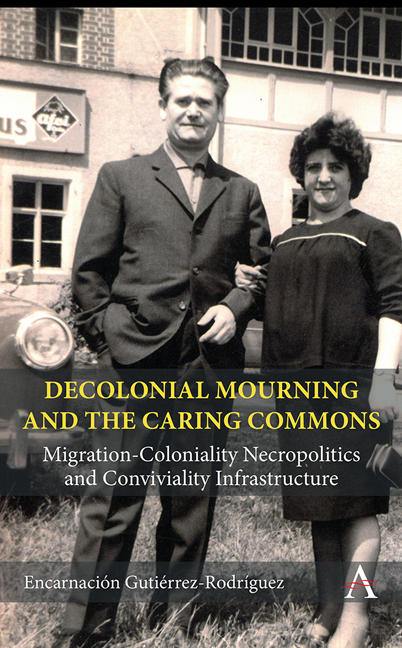 Decolonial Mourning and the Caring Commons
Decolonial Mourning and the Caring Commons Published online by Cambridge University Press: 29 February 2024
Introduction
This chapter introduces mourning as political work. It draws on Hannah Arendt's (1958) approach to action while critically exploring grief work as a site of the political. I revise Arendt's distinction of action, labor and work by engaging with Kathryn Sophia Belle's (formerly Kathryn T. Gines, 2014) feminist and anti-Black racism critique. Offering an understanding of mourning as communal political work, I engage with Gillian Rose's (1992) mourning as intense work and conclude with Athena Athanasiou's (2017) reflections on agonistic mourning.
Labor, Work and Action
In The Human Condition, published in the United States in 1958 and translated by the author into German two years later as Vita Activa oder vom tätigen Leben, Arendt introduces her analysis of the modern subject as conditioned by work, labor and action. Tracing the historical transformation of the divide between the polis as the sphere of the public and the oikos as that of the private, Arendt proposes looking at action as a site of intellectual deliberation and political transformation. Revising the occidental philosophical account of the distinction between labor and work from Ancient Greece to modern European bourgeois society, Arendt draws our attention to the distinction in Greek philosophy between theory as vita contemplativa and praxis as vita activa. Focusing on “doing” as the driver for action, Arendt approaches the sphere of the vita activa that will be translated into German as tätiges Leben as the site of the immediacy of the political. The political is intertwined with praxis—with the immediacy of action.
Arendt's definition of political action inspires my approach to mourning as political communal labor. Yet, while Arendt's analysis differentiates between action—as the sphere attached to universal transcendental practices—and work and labor, as pertaining to mundane activities of immediate reproduction—I propose, aligning with Steven Colatrella (2013) and Mika Ojakangas (2020), that we complicate this divide. Mourning as communal political action, I suggest, results in the entanglement of action, work and labor. The activities constituting mourning as the sphere of the political, I will argue, are configured by collective forms of exchange and deliberation but also by the immediate work constituting our daily interdependent lives. Mourning as political communal action emanates from the routinized work and reproductive labor constituting our social relations.
To save this book to your Kindle, first ensure [email protected] is added to your Approved Personal Document E-mail List under your Personal Document Settings on the Manage Your Content and Devices page of your Amazon account. Then enter the ‘name’ part of your Kindle email address below. Find out more about saving to your Kindle.
Note you can select to save to either the @free.kindle.com or @kindle.com variations. ‘@free.kindle.com’ emails are free but can only be saved to your device when it is connected to wi-fi. ‘@kindle.com’ emails can be delivered even when you are not connected to wi-fi, but note that service fees apply.
Find out more about the Kindle Personal Document Service.
To save content items to your account, please confirm that you agree to abide by our usage policies. If this is the first time you use this feature, you will be asked to authorise Cambridge Core to connect with your account. Find out more about saving content to Dropbox.
To save content items to your account, please confirm that you agree to abide by our usage policies. If this is the first time you use this feature, you will be asked to authorise Cambridge Core to connect with your account. Find out more about saving content to Google Drive.